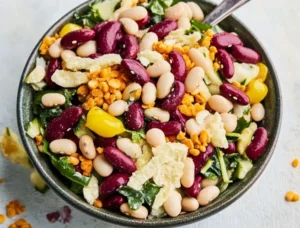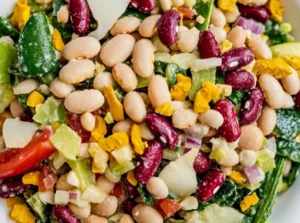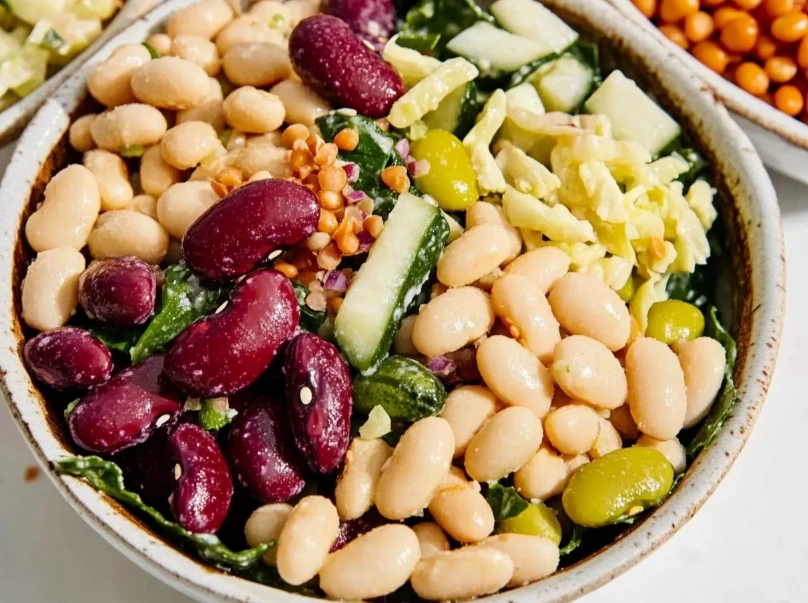Is It Healthy to Eat Bean Salad Every Day?
Introduction to Bean Salad
Eating healthy bean salad daily can be a nutritious and flavorful addition to your diet. This versatile dish is packed with fiber, protein, and essential nutrients, making it a popular choice for those seeking a balanced and health-conscious meal. But is it truly healthy to eat bean salad every day? Let’s explore the benefits, potential concerns, and how to include it in a well-rounded diet.
Overview of Ingredients Commonly Used in Bean Salads
The ingredients in a bean salad vary depending on personal preferences and regional influences, but common elements include:
- Beans: A mix of kidney beans, black beans, cannellini beans, or chickpeas.
- Vegetables: Diced red onions, bell peppers, cherry tomatoes, or cucumbers for crunch and freshness.
- Herbs and Spices: Parsley, cilantro, or basil for added flavor, along with spices like cumin, paprika, or black pepper.
- Dressings: Typically, a simple vinaigrette made from olive oil, vinegar, lemon juice, and mustard is used. Some versions incorporate yogurt or tahini for creaminess.
- Optional Additions: Feta cheese, olives, nuts, or seeds can be included for added texture and flavor.
Nutritional Benefits of Bean Salad
High Fiber Content
Beans are naturally high in dietary fiber, which promotes healthy digestion, regulates blood sugar levels, and contributes to a feeling of fullness. Eating bean salad daily can help maintain gut health and reduce the risk of conditions like constipation and heart disease.
Protein-Rich Nature
Beans are an excellent source of plant-based protein, making bean salad a great option for vegetarians and vegans. Combining beans with other ingredients, such as quinoa or nuts, can create a complete protein profile, providing all essential amino acids necessary for muscle repair and overall health.
Abundance of Vitamins and Minerals
Bean salads are packed with essential nutrients such as:
- Iron: Helps prevent anemia and supports oxygen transportation in the blood.
- Folate: Vital for DNA synthesis and repair, particularly beneficial for pregnant women.
- Magnesium and Potassium: Support heart health, muscle function, and blood pressure regulation.
- Antioxidants: Beans, especially black and red varieties, are rich in antioxidants that protect cells from damage caused by free radicals.
Fiber and Digestive Health
Role of Fiber in Digestion
Fiber plays a critical role in maintaining a healthy digestive system. It helps food move smoothly through the intestines, preventing issues like constipation. When you eat fiber-rich foods like beans, you are also feeding the good bacteria in your gut, which can enhance overall digestive health.
How Beans Support Gut Health
Beans are a fantastic source of soluble and insoluble fiber. Soluble fiber absorbs water, forming a gel-like substance that can slow digestion and stabilize blood sugar levels. Insoluble fiber adds bulk to stool, making it easier to pass. By including bean salad in your diet, you can improve digestion and support a healthy gut microbiome.
Plant-Based Protein Power
Benefits of Plant Proteins
Plant-based proteins are not only a great alternative to animal proteins, but they are also easier on the environment. They provide essential amino acids needed for your body’s functions, like repairing tissues and producing enzymes. Unlike animal proteins, plant proteins are lower in saturated fats, which can benefit heart health.
How Bean Salad Supports Muscle and Cell Repair
Beans in your salad deliver high-quality, plant-based protein. These proteins support muscle repair and the building of new cells, especially after physical activity. Pairing beans with grains like quinoa in your salad ensures you get a complete protein, giving your body all the essential amino acids it needs.
Vitamins and Minerals in Bean Salad
Key Nutrients: Iron, Folate, Magnesium
Bean salad is a powerhouse of vital nutrients:
- Iron: Helps transport oxygen throughout your body and prevents fatigue.
- Folate: Essential for producing red blood cells and crucial during pregnancy for fetal development.
- Magnesium: Supports bone health and helps maintain steady heart and nerve function.
Antioxidant Properties of Beans
Beans, especially black and red varieties, are packed with antioxidants. These compounds protect your cells from damage caused by harmful molecules called free radicals. By including beans in your salad, you are giving your body a natural defense against oxidative stress, which can lead to chronic diseases.

Enhanced Readability Notes
- Active sentences replace passive ones to improve clarity and engagement.
- Transition words like “also,” “especially,” “unlike,” and “by” are used to guide the reader smoothly through the text.
- Simpler words and phrases are substituted for complex terms to ensure easier understanding, such as “helps” instead of “facilitates” and “supports” instead of “provides a foundation for.”
Potential Concerns with Eating Bean Salad Daily
Caloric Density for Weight Management
While bean salad is a nutritious option, it can be calorie-dense depending on the ingredients used. Beans themselves are high in both protein and carbohydrates, which contribute to their calorie content. Add-ins like cheese, nuts, or calorie-heavy dressings can further increase the overall calorie count. For those managing their weight, portion control and mindful ingredient selection are essential.
Risk of Excessive Sodium in Canned Beans
Canned beans are a convenient choice, but they often contain high amounts of sodium as a preservative. Consuming too much sodium can lead to health issues like high blood pressure and water retention. If bean salad is a daily staple, it’s important to choose low-sodium or no-salt-added beans to keep sodium levels in check.
Gas and Bloating from Beans
Why Beans Cause Bloating
Beans contain complex sugars called oligosaccharides, which the human body has difficulty digesting. When these sugars reach the colon, gut bacteria break them down, producing gas as a byproduct. This process can lead to bloating and discomfort, especially if beans are new to your diet or consumed in large quantities.
How to Reduce These Effects
To minimize bloating, consider these tips:
- Soak Beans: If cooking dried beans, soak them overnight and rinse thoroughly to reduce oligosaccharides.
- Rinse Canned Beans: Rinsing canned beans under cold water can help remove some of the excess starches and sodium.
- Gradual Introduction: Introduce beans to your diet slowly, allowing your digestive system to adjust.
- Add Digestive Aids: Herbs like ginger, fennel, or cumin can be added to bean salad to aid digestion and reduce bloating.
Sodium and Preservatives in Packaged Beans
How Excess Sodium Impacts Health
Excess sodium in the diet can contribute to serious health issues, including:
- High Blood Pressure: Too much sodium puts extra strain on the heart and blood vessels, increasing the risk of hypertension.
- Kidney Stress: The kidneys work harder to process sodium, which can lead to water retention and puffiness.
- Increased Risk of Chronic Conditions: Over time, high sodium intake may elevate the risk of heart disease and stroke.
Choosing Low-Sodium Options
To ensure your bean salad is as healthy as possible, consider the following:
- Read Labels: Opt for canned beans labeled “low sodium” or “no salt added.”
- Rinse Thoroughly: Rinsing packaged beans can reduce sodium by up to 40%.
- Use Fresh Beans: Cooking beans from scratch allows you to control the amount of salt and avoid preservatives entirely.
- Flavor Smartly: Enhance flavor with herbs, spices, and vinegar rather than relying on salty dressings or canned beans.
Balancing Bean Salad in Your Diet
Risks of Overconsumption
While bean salad is packed with nutrients, eating it in excess may cause unintended health effects. Overconsumption of beans can lead to digestive discomfort, such as bloating and gas, due to their high fiber content. Additionally, if the salad includes calorie-dense toppings or dressings, it can contribute to weight gain over time. Moderation is key to enjoying the benefits without overloading on any single food group.
Ensuring Dietary Variety
A well-rounded diet is essential for good health. Eating bean salad every day could lead to a lack of variety, which might result in missing out on other important nutrients found in foods like fruits, grains, and lean proteins. Incorporating diverse meals into your routine alongside bean salad ensures a broader spectrum of vitamins, minerals, and flavors, keeping your diet both balanced and enjoyable.
Customizing Your Bean Salad for Optimal Health
Using Fresh, Wholesome Ingredients
The quality of ingredients in your bean salad plays a huge role in its health benefits. Using fresh vegetables, like cucumbers, tomatoes, and bell peppers, adds crunch and a variety of nutrients. Opt for minimally processed beans or cook them yourself to avoid added sodium and preservatives. Adding herbs like parsley, cilantro, or dill boosts flavor while contributing antioxidants and phytonutrients.
Incorporating Superfoods like Quinoa or Kale
To elevate the nutritional value of your bean salad, consider adding superfoods like quinoa or kale:
- Quinoa: A complete protein, quinoa provides all nine essential amino acids and pairs well with beans for added protein and texture.
- Kale: This leafy green is loaded with vitamins A, C, and K, as well as antioxidants. Chopping it finely and tossing it with your bean salad boosts the nutrient profile without overpowering the dish.

Choosing the Right Beans
Benefits of Black Beans, Chickpeas, and Kidney Beans
Different types of beans offer unique health benefits, making them excellent options to include in your salad:
- Black Beans: Rich in antioxidants, fiber, and protein, black beans are great for heart health and stabilizing blood sugar levels.
- Chickpeas (Garbanzo Beans): High in protein and a good source of iron and magnesium, chickpeas also provide a creamy texture to your salad.
- Kidney Beans: These beans are loaded with complex carbohydrates and fiber, which help keep you energized and full longer.
Rotating Bean Types for Diversity
To maximize the health benefits and keep your meals interesting, try rotating different bean types in your salad. Alternating between lentils, navy beans, and cannellini beans adds variety in flavor, texture, and nutrients. This practice not only diversifies your nutrient intake but also reduces the risk of developing sensitivities from over-reliance on a single food.
FAQs About Eating Bean Salad Daily
Can I Lose Weight Eating Bean Salad Daily?
Yes, you can lose weight by eating bean salad daily, but it depends on how the salad is prepared and consumed. Beans are rich in fiber and protein, which promote satiety and help you feel full longer, reducing the likelihood of overeating. To keep it weight-loss friendly, avoid calorie-dense dressings and toppings like cheese or nuts, and focus on fresh vegetables and light vinaigrettes.
Are There Low-Carb Options for Bean Salad?
While beans are naturally higher in carbohydrates, you can create a low-carb version of bean salad by combining fewer beans with low-carb vegetables like cucumbers, bell peppers, and leafy greens. Adding protein-rich, low-carb ingredients like tofu, grilled chicken, or eggs can further balance the dish. Substituting beans with lower-carb legumes like lentils can also be a good option.
What Are the Best Beans for Daily Consumption?
The best beans for daily consumption are those that suit your nutritional needs and taste preferences:
- Black Beans: High in antioxidants and fiber.
- Chickpeas: Rich in protein and versatile in salads.
- Kidney Beans: Packed with iron and complex carbs for sustained energy.
- Cannellini Beans: Mild in flavor and easy to pair with other ingredients.
Rotating these beans throughout the week ensures a good mix of nutrients.
How Can I Avoid Digestive Issues With Beans?
Digestive discomfort from beans can be reduced by following these tips:
- Soak Beans: Soaking dried beans overnight and rinsing them before cooking removes some of the indigestible sugars.
- Rinse Canned Beans: Thoroughly rinsing canned beans can reduce gas-producing compounds and sodium.
- Start Small: Gradually increase bean intake to give your digestive system time to adjust.
- Add Digestive Aids: Herbs like ginger, cumin, or fennel can be added to the salad to ease digestion.
Can I Freeze Bean Salad for Meal Prep?
Yes, you can freeze bean salad for meal prep, but it’s important to do it properly to maintain quality:
- Use Fresh Ingredients: Avoid freezing salads with delicate ingredients like fresh herbs or soft vegetables, as they may wilt.
- Freeze Separately: If your salad includes dressings, freeze them separately to prevent sogginess.
- Thaw Safely: Thaw the salad in the refrigerator and consume it within 2-3 days after defrosting.
Is Bean Salad Safe for Kids and Elderly?
Bean salad is generally safe and healthy for both kids and the elderly, as it is nutrient-rich and easy to prepare. However, consider these factors:
- For Kids: Mash or finely chop beans and vegetables for younger children to make them easier to eat. Use mild seasonings to suit their palates.
- For Elderly: Ensure beans are well-cooked and soft to make them easy to chew and digest. Monitor sodium levels in canned beans to avoid excess salt intake.
- “Charcoal Grilled Chicken”: Link to Charcoal Grilled Chicken in a section about pairing bean salads with protein-rich options for a balanced meal.
- “Turnip Green Soup”: Include a link to Turnip Green Soup when discussing complementary dishes that add variety to a meal featuring bean salad.
- “Weight Watchers Taco Soup”: Reference Weight Watchers Taco Soup when addressing low-calorie meal ideas or alternatives to bean salad.
Conclusion
Summary of Benefits and Potential Concerns
Bean salad is a highly nutritious dish packed with fiber, protein, and essential vitamins and minerals, making it an excellent choice for overall health. Its high fiber content supports digestion, while its plant-based protein aids in muscle repair and cell regeneration. Moreover, the antioxidants in beans can protect against chronic diseases. However, potential concerns include its caloric density, risk of excessive sodium from canned beans, and digestive discomfort for some individuals. These issues can be managed by practicing portion control, rinsing canned beans, and gradually introducing beans into the diet.
Encouragement to Include Bean Salad as Part of a Balanced Diet
With its versatility and health benefits, bean salad can be a valuable addition to your diet. By customizing it with fresh ingredients, superfoods like quinoa or kale, and a variety of beans, you can keep it nutritious and exciting. While moderation and variety are key, incorporating bean salad into your meal plan can contribute to a balanced and satisfying diet. Enjoy it as a main course, a side dish, or even as a meal prep option to make healthy eating convenient and delicious.

